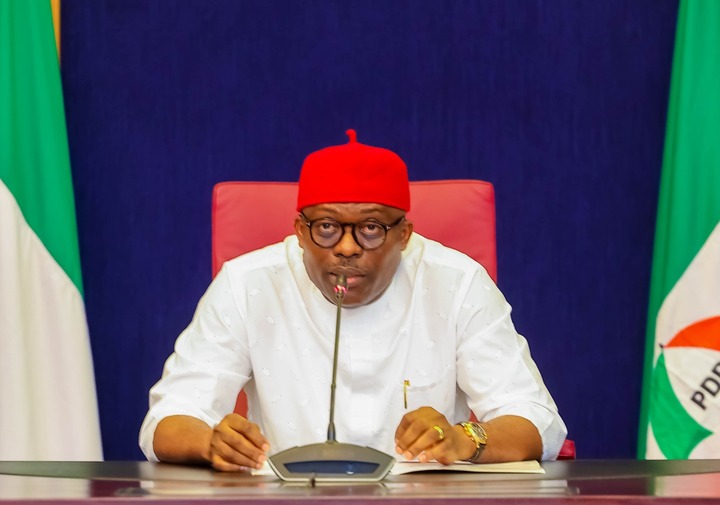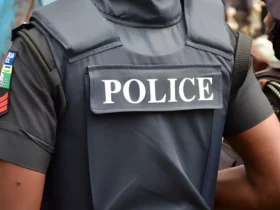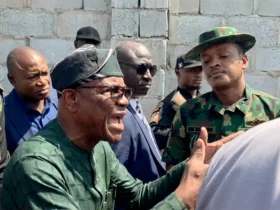Rivers’ road to emergency politics: A recap

For the sake of robust history, chroniclers of political events in Rivers State should add voices to what official record presents, so that there are perspectives to it. We cannot allow government historians to dump their version as the whole truth. Generations to come might look up the history of Emergency Rule (theory and practice) in the country; we owe them the truth and to present matters the way they unfolded in the past 28 months.
President Tinubu, last week, restored democratic rule in Rivers State, which he disrupted for six months beginning on March 18, 2025, in his Emergency Rule declaration. Whether what he did was exactly what the Constitution (1999 with amendments) recommended, is one issue legal scholars have differed remarkably.
While a few agreed the President did well to impose an emergency, more numbers said it was a needless exercise, except to serve a pre-determined agenda. The body of lawyers, the Nigerian Bar Association (NBA), said the imposition was a constitutional breach.
The President confessed that his action was hotly contested in the judiciary, when he said: “I am not unaware that there were a few voices of dissent against the proclamation, which led to their instituting over 40 cases in the courts in Abuja, Port Harcourt, and Yenagoa, to invalidate the declaration.” Except that the gamut of 40 cases cannot be said to be “a few voices of dissent.”That’s part of the official reinterpretation of facts that cannot be allowed.
In President Tinubu’s address last week, he attempted to seek a justification. He said the context for the imposition of emergency was because of “a total paralysis of governance in Rivers State, which had led to the Governor of Rivers State and the House of Assembly being unable to work together.” Yes, six months after he assumed office on May 29, 2023, Fubara and his godfather, former Governor Nyesom Wike became estranged. It was Wike who single-handedly recruited Fubara and sponsored his election. Wike said he couldn’t let go the political structure he built. That’s the context which Mr President would prefer to obliterate.
In fact, a more proper context dates back to pre-2023 elections, when candidate Bola Ahmed Tinubu frolicked with five dissident governors of the Peoples Democratic Party (PDP), led by Wike, to undo their party for the purpose of enhancing BAT’s electoral chances. After that successful collaboration, which fetched BAT the presidency, Wike was compensated with the portfolio of FCT minister. Wike became a highly favoured ally of the President. Wike could do no wrong in the political eyes of President Tinubu.
Was there a total paralysis of governance in Rivers State? Not quite. It is true that by September 2023, 27 lawmakers of the Rivers State House of Assembly, loyal to Wike, publicly defected from the PDP to the All Progressives Congress (APC).They filed a suit (No. FHC/ABJ/1681/CS/2023), at the Federal High Court, Abuja, in December 2023, to restrain INEC and PDP from declaring their seats vacant.
An interim order issued by Justice Donatus Okorowo of the Federal High Court, Abuja, actually restrained INEC. That was public knowledge. But upon realising that they had no basis in the Constitution (Section 109 (1)(g) to defect, as there was no division in the PDP at the time, they became stranded. President Tinubu invited them and Governor Fubara for a political settlement, to rescue the 27 lawmakers from attempted political suicide. They were misguided.
But when they got back to Port Harcourt, matters got worse. The peace meeting failed. Popular opinion held that the defected lawmakers had lost their seats constitutionally, except that Abuja rose to shield them from the long arm of justice. There was tension as each side battled for survival.
The governor’s camp worked on the theory that the defected lawmakers had lost constitutional authority to function. But they continued to hold parallel sessions. On December 13, 2023, Governor Fubara ordered the demolition of the State Assembly Complex in Port Harcourt, citing structural defects. Fubara’s camp apparently calculated that allowing the lawmakers a legitimate place to plot could harm the governor’s interest. With Abuja on their side, the 27 lawmakers had concluded plans to impeach the governor.
Governance wasn’t paralysed in the sense President Tinubu painted. Fubara and the four lawmakers who were committed to the course of liberating Rivers people from one-man rule managed to run the state affairs. They formulated and passed two budgets and also held a successful local government election in October 2024. To say there was a total paralysis of governance is an exaggeration. Yes, there was absence of cohesion, which is bad for democracy.
The President said that “critical economic assets of the state, including oil pipelines, were being vandalised”, as additional reason for toppling the government. Yes, there were reports of two explosions on the Trans-Niger Pipeline. But there was no independent report that linked the attacks to the political turmoil in the state and to the governor.
With what the public knows of the crises, it was not beyond the characters who promoted emergency rule as a solution to instigate vandalism to give a dog a bad name. The timing was suspect because the emergency declaration was made the same day that the attacks was reported. The plotters succeeded and President Tinubu couldn’t wait to carry out proper checks.
We recall that even in those days the Niger Delta was the hotbed of militancy, governments at the time did not recommend emergency rule. The Obasanjo-led government used the carrot and stick solution to deal with it. Umar Yar’Adua introduced amnesty for militants and that went a long way to restore peace. Amnesty was not deployed to facilitate state capture to meet selfish political ends. The difference is clear.
The reason Mr President’s intervention and that of other well-meaning Nigerians failed to resolve the impasse because both sides stuck to their positions rigidly, as purported, was because there was no justice in the interventions. Abuja had been notoriously partisan even before the face-off became self-evident.
The resolution reached at the peace meeting of December 18, 2023, at the instance of the Presidency was manifestly one-sided. The number three item of that resolution stated that “the leadership of the Rivers State House of Assembly as led by the Rt. Hon. Martin Amaewhule shall be recognised alongside the 27 members who resigned from the PDP.”
Here we have an APC presidency endorsing a constitutional breach and using state machinery to impose it on the governor, who had been ordered to withdraw all court cases, including the one on lawmakers who defected without cause. As the President stated, there were a series of cases filed by both sides against each other.
It was expected, giving the way the judiciary now functions that the cases would take time to be resolved. If only the Judiciary meant well. But the President had no patience for legal gymnastics.
On February 28, 2025, the Supreme Court finally ruled on the Rivers political crises; restored the Amaewhule-led faction of the Assembly. The Court said despite the audio and video evidences as well as court records, there was no sufficient reason to prove their defection from PDP to APC.
The court ordered the Central Bank to freeze funding of the 23 local government areas in the state, after invalidating the October 2024 local government election; and also barred the Rivers State Independent Electoral Commission (RSIEC), from using INEC’s voter register and security agencies from providing support, three months after the elections were held.
The similarity between the judgment and the resolution reached by the peace meeting brokered by the Presidency on December 18, 2023, was not lost on the perceptive audience.
In the aftermath of the judgment, Fubara pledged to commence implementation while his legal team awaited the Certified True Copy (CTC). But the Federal Government will have none of that. President Tinubu slammed the emergency rule and heavens didn’t fall.
The President was right to state that the key to a successful government is a harmonious relationship between the executive and legislature. But that expectation would be unrealised “in an atmosphere of violence, anarchy and insecurity borne by misguided political activism and Machiavellian manipulations among stakeholders.”
In the Rivers case, average citizens know who the manipulators are. Abuja is the major manipulator and beneficiary of the Rivers crises. If Abuja had warned the troublemakers not to engage in misguided political activism and also encourage the judiciary to dispense justice without fear or favour, the crises would have long ended and democracy would be stronger.
Six months after, testimonies from the streets of Port Harcourt confirm that the six months of emergency rule were a total waste as evidenced in abandoned projects. Even the returning lawmakers have indicated to set up machinery to demand accountability for the resources that accrued to the state, as they also do not see evidence of work done.
But the emergency Sole Administrator, Vice Admiral Ibok-Ete Abas (rtd), is very proud of his achievements. He announced gleefully that he had fulfilled the presidential mandate that was handed to him.
He was able to dismantle the bureaucracy put in place by the elected government of Fubara. He reconstituted RSIEC and boards of other agencies, handing the reins to pro-Wike elements and rendering the Fubara camp to become mere spectators. Ibas said: “With the successful conduct and swearing-in of local government chairmen and their councils, I believe we have decisively achieved the mandate that we were given.”
The emergency rule is indeed a decisive plot and lucrative venture for Wike and his camp. They have taken back the political structure Fubara attempted to recalibrate to suit his purpose as the CEO of Rivers State. The outcome of the August 18 council election conducted by the emergency administration is very clear. APC now rules Rivers despite Wike still fishing in troubled PDP waters.
History has taken note of all the plots, including the roles played by the Idi Amins of Abuja and judases at home. No amount of propaganda or revisionism could manipulate the record. It was a savage attack on democracy.








Leave a Reply